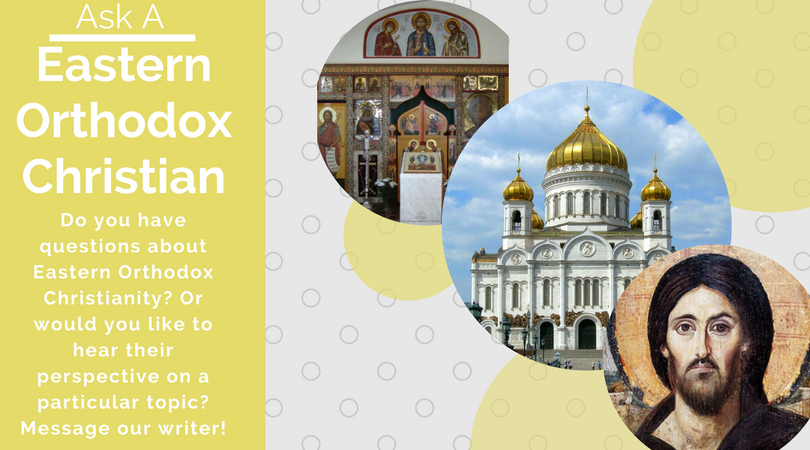Ask An Eastern Orthodox Christian: I’m Considering Converting
What would you like to know about the Eastern Orthodox Christian faith? Submit your question.
Hello, I’m currently a Roman Catholic but am considering conversion to Eastern Orthodoxy based on a few doctrinal differences. Here are my questions.
How does the Orthodox understanding of the Trinity affect our understanding of the Holy Spirit in Christian life, as opposed to the Filioque?
The word Filioque is a Latin word meaning “and the Son.” In the 11th century, the Roman Catholic Church inserted this Latin phrase into the original declaration of what the ancient church (East and West) believed, the Nicene Creed.
The insertion of the Filioque into the Nicene Creed now reads as follows: “And in the Holy Spirit, the Lord, the Creator of Life, “Who proceeds from the Father AND THE SON….”). This doctrine of double procession, of the Spirit proceeding from the Father and the Son, destroys the balance of co-equal Persons of the Trinity. The Holy Spirit now becomes a subordinate member of the Trinity in His role in the life of the church and creation.
In the Third Ecumenical Council of Ephesus in 431 A.D, the cannons explicitly prohibit and anathematize any addition or modification to the Nicene Creed. The Filioque is also contrary to Scripture, particularly in John 15:26: “But when the Helper comes, whom I (Christ) shall send to you from the Father, the Spirit of truth Who proceeds from the Father, He will testify of Me.” Thus, Christ never describes the Holy Spirit as proceeding from Himself but only mentions the Spirit’s procession in terms of the Father, the source, the fountainhead, the Origin of both unbegotten Son and the procession of the Holy Spirit.
What can we understand about the role of Saint Peter if he is not the “rock of the church” as Catholics claim?
In Matthew 16:18, “And I also say to you that you are Peter, and on this rock, I will build My church, and the gates of Hades shall not prevail against it.” The New Testament was written in the ancient Greek language. The word “rock” in the passage is in the feminine (petra rather than the masculine petros). The “rock” implies Saint Peter’s statement of faith rather than St. Peter himself. The foundation and the “rock of the Church” is Christ, not Saint Peter.
James the just, the half-brother of the Lord, was the leader and presider of the apostles in the First Council of Jerusalem (Acts 15), not Saint Peter who was first among equals. No apostle was infallible as the Apostle Peter almost caused a schism in the church with his debate with Apostle Paul. Paul does not refer to Peter as the head of the church and never commands his churches to recognize the Apostle Peter as their Supreme head. In fact, Paul rebuked Peter face-to-face for succumbing to false doctrine. Marcellinus was the first person ever recorded with the title of Pope in the year304 A.D. exactly 271 years after Christ’s church was established.
What does the Orthodox Church believe about original sin and why does it matter?
From the Bible in the Book of Genesis, God created Adam and Eve, who lived in the Garden of Eden. One of the challenges for Adam was to follow the commandment given to him from God stated in the following Scripture.
Gen 2: 16-17 And the Lord God commanded Adam, saying, “You may eat food from every tree in the garden: but from the tree of the knowledge of good and evil you may not eat; for in whatever day you eat from it, you shall die by death.”
Original Sin … In the Roman Catholic Church, this doctrine states that everyone is born sinful because of Adam and Eve’s disobedience. In the Orthodox tradition, man does NOT have a “sinful and fallen nature.” However, all of humanity suffers from the effects and consequences of Adam’s disobedience, which is death and sin. This is why the church fathers refer to this event as “ancestral sin” rather than the western doctrine of original sin. On further reflection, death is unavoidable, whereas sin in our lives is by choice.
NOTE … There are many doctrinal differences between the Eastern Orthodox Church and the Roman Catholic Church. For a list of those differences, I would encourage anyone to reference these in a previous article titled “What are your thoughts on Roman Catholicism?”
https://form.jotform.com/form/82767011384155









… [Trackback]
[…] Read More here: favs.news/ask-an-eastern-orthodox-christian-im-considering-converting/ […]